The V.P. Kukhar Institute of Bioorganic Chemistry and Petrochemistry of the National Academy of Sciences of Ukraine is accepting applications for postgraduate studies in 2025 in the following specializations: E3 “Chemistry” and E1 “Biology and Biochemistry”.
Educational activities at the V.P. Kuliahin Institute of Bioorganic Chemistry and Petrochemistry of the National Academy of Sciences of Ukraine are carried out in accordance with the order of the Ministry of Education and Science of Ukraine No. 19–l dated February 22, 2021 Kukharia of the National Academy of Sciences of Ukraine is carried out in accordance with the order of the Ministry of Education and Science of Ukraine No. 19-l dated February 22, 2021, “On licensing educational activities at the third educational and scientific level,” according to accredited educational and scientific programs: “Bioorganic Chemistry; Petrochemistry and Coal Chemistry” (specialties 102 “Chemistry,” E3 ‘Chemistry’), “Bioorganic Chemistry” (specialties 091 “Biology,” 091 “Biology and Biochemistry,” E1 “Biology and Biochemistry”).
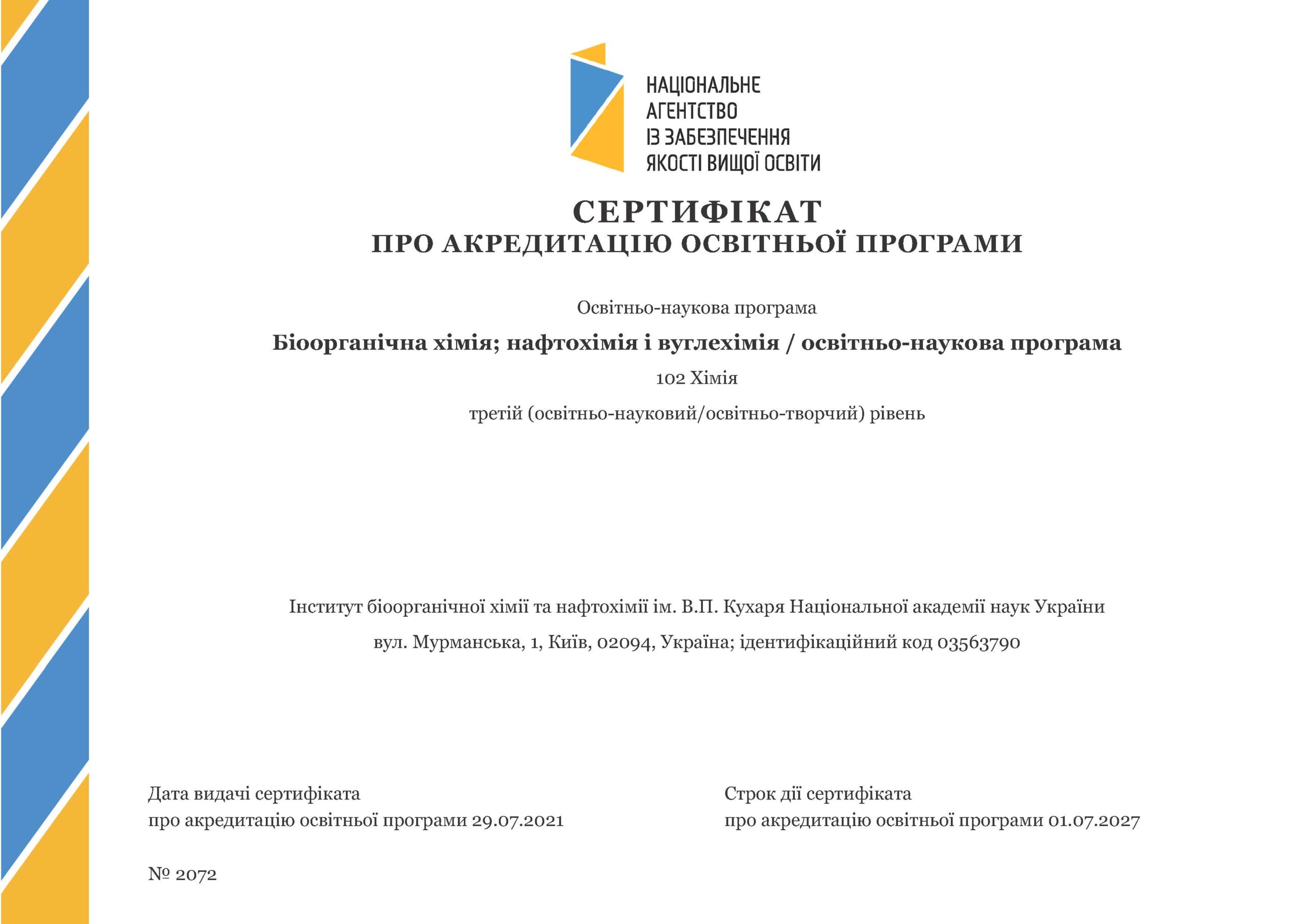
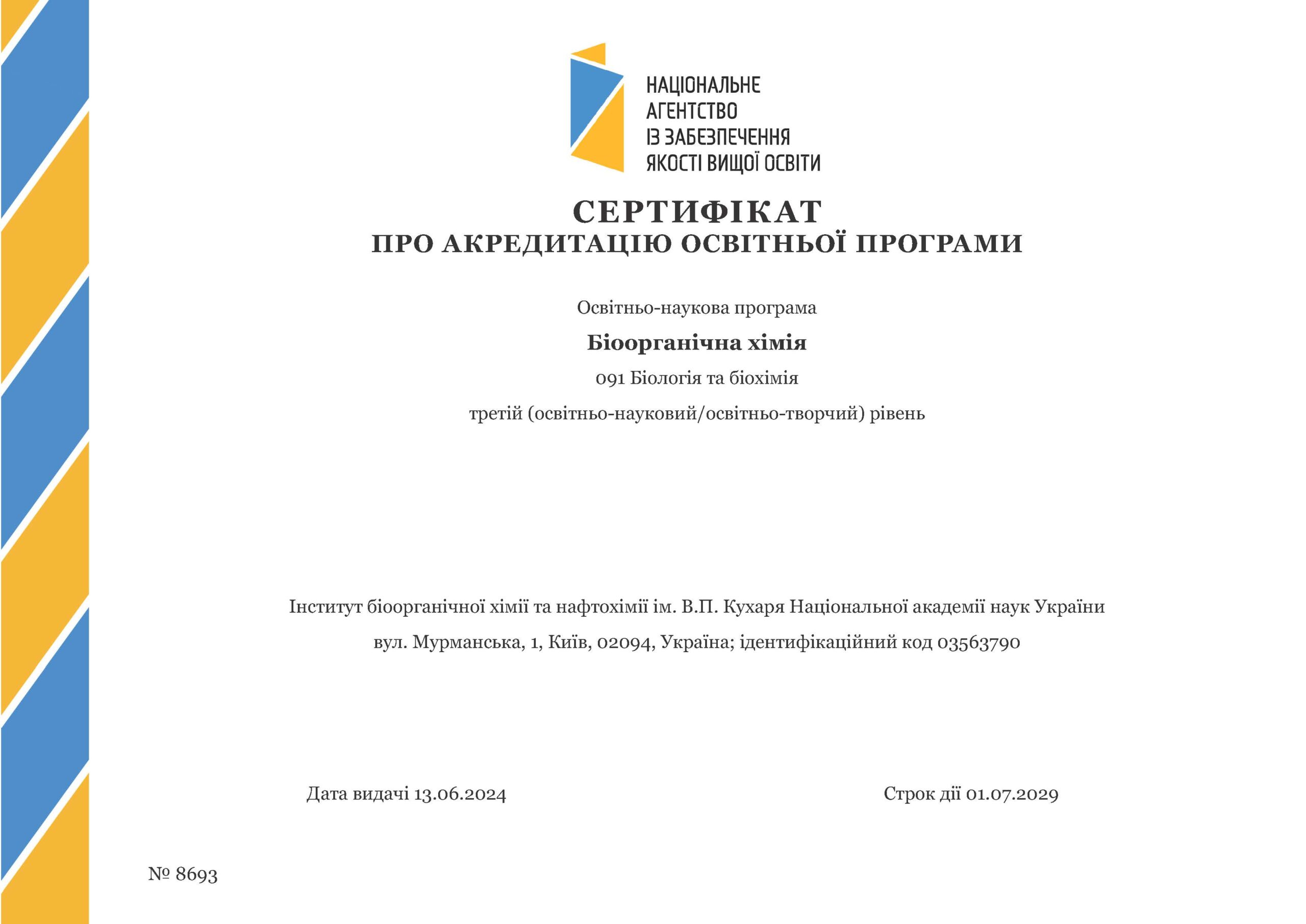
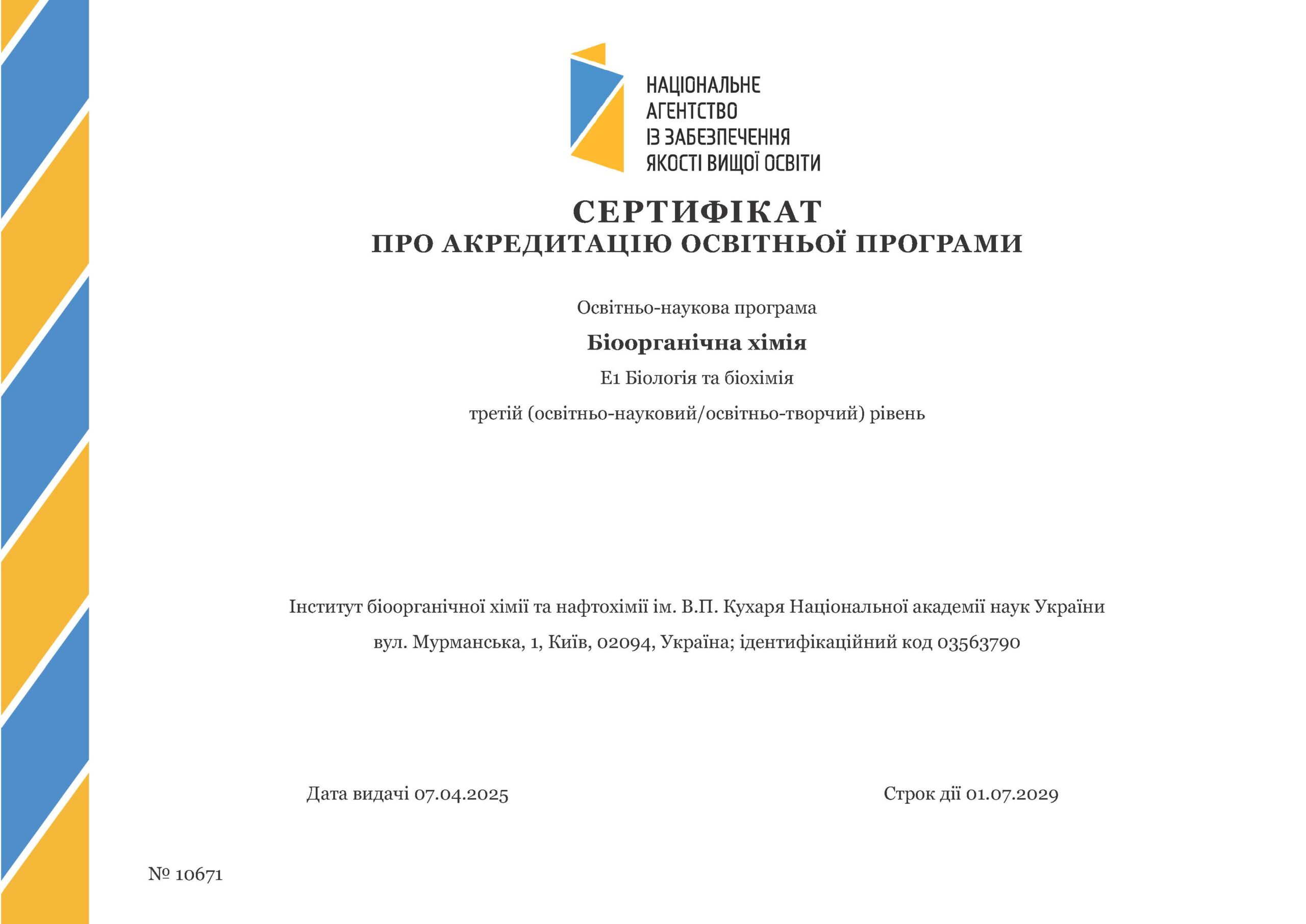
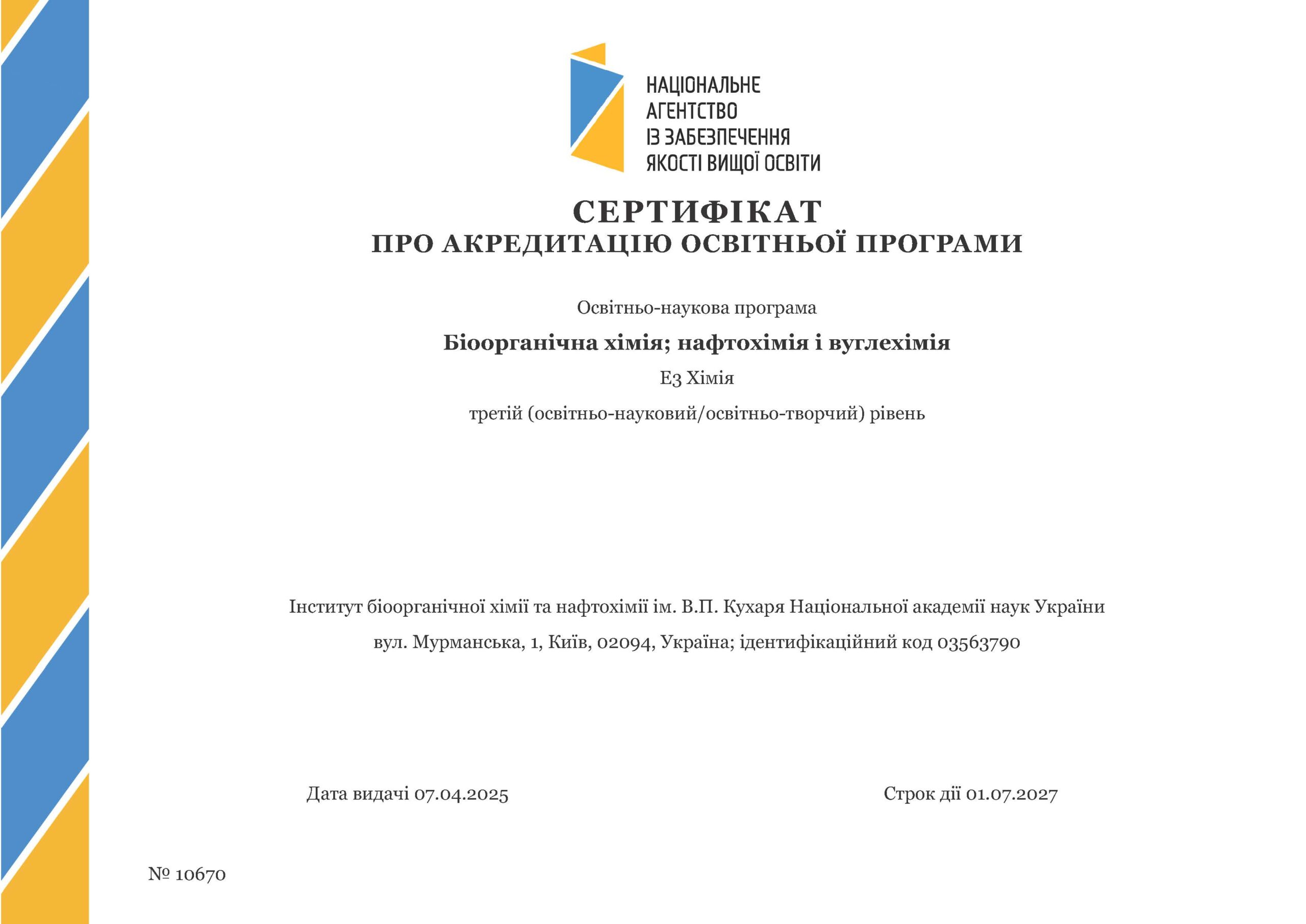
The training of highly qualified scientific personnel at the V.P. Kukhar Institute of Bioorganic Chemistry and Petrochemistry of the National Academy of Sciences of Ukraine is carried out through full-time postgraduate studies. Leading scientists of the Institute, in close cooperation with educators and scientists from higher education institutions and scientific institutions in Ukraine and abroad, are actively involved in the development and implementation of educational and scientific programs for the training of PhD candidates. Educational and scientific programs are developed taking into account current trends in the development of specialties and the labor market, which indicate the need to train highly qualified scientists who have the necessary knowledge, modern methods of chemical and biological research and analysis of the results obtained, and are able to propose and implement scientific projects and publish their results in high-ranking scientific journals. Doctoral students studying at the Institute at the expense of the State Budget of Ukraine are provided with a monthly scholarship. Postgraduate students have the opportunity to continue fundamental and applied research under the guidance of highly qualified staff of the Institute, participate in various grants and international programs.
The condition for admission to the entrance examinations is the successful completion of the EIT in research methodology in 2025 and the successful completion of the EIT in 2023, 2024, or 2025 with a score of at least 150 points for each of its blocks.
To participate in the competitive selection for postgraduate studies, you must collect and submit the following documents:
Passport, diploma and diploma supplement on the previously obtained educational degree (educational and qualification level) and military registration document shall be submitted by applicants in person.
The selection of a scientific supervisor is based on the main areas of his/her scientific research (see the section of the website “Departments”). List of potential scientific supervisors
More details about the rules for admission to postgraduate studies.
The Admissions Committee of the Institute operates in accordance with the “Regulations on the Admissions Committee of the Institute of Bioorganic Chemistry and Petrochemistry of the National Academy of Sciences of Ukraine” and Order No. 1085 of the Ministry of Education and Science of Ukraine dated October 15, 2015.
Documents from applicants will be accepted from August 25 to September 10, 2025, at the following address: 1 Akademika Kukharia St., Kyiv (Lisova metro station), room 214.
Contact person:
Galina Ivanivna Gupalova
Department of Scientific and Organizational Work and Intellectual Property
02094, Ukraine, Kyiv, Akademika Kukharia St., 1
+38 (068) 902 9390
Entrance exam programs
Specialty E3 Chemistry
Specializations
“Bioorganic Chemistry” Entrance exam program (Ukr.) (Eng.).
“Petrochemistry and Carbon Chemistry” Entrance exam program (Ukr.) (Eng.).
Specialty E1 Biology and Biochemistry
“Bioorganic Chemistry” Entrance Examination Program (Ukr.) (Eng.).
Additional entrance examination programs
(for applicants entering graduate studies in a field of knowledge (specialty) other than that indicated in their master’s (specialist) diploma).
Specialty E3 Chemistry
Specialty E1 Biology and Biochemistry
Educational activities at the V.P. Kukhary Institute of Bioorganic Chemistry and Petrochemistry of the National Academy of Sciences of Ukraine are carried out in accordance with accredited educational and scientific programs: “Bioorganic Chemistry; Petrochemistry and Coal Chemistry” (specialty E3 ‘Chemistry’), “Bioorganic Chemistry” (E1 “Biology and Biochemistry”).
Educational and scientific program “Bioorganic Chemistry; Petrochemistry and Carbon Chemistry” in specialty E3 ‘Chemistry’ (Ukr.) (Eng.).
Educational and scientific program “Bioorganic Chemistry” in specialty E1 “Biology and Biochemistry” (Ukr.) (Eng.).
The selection of a scientific supervisor is based on the main areas of his scientific research.
List of potential scientific supervisors –
E3 “Chemistry” Field of scientific activity
Volodymyr Brovarets – Doctor of Chemical Sciences, Professor, Corresponding Member of the National Academy of Sciences of Ukraine, Director of the V.P. Kukhar Institute of Bioorganic Chemistry of the National Academy of Sciences of Ukraine, 02.00.10. – Bioorganic Chemistry.
Andrii Vovk – Doctor of Chemical Sciences, Professor, Corresponding Member of the National Academy of Sciences of Ukraine, Advisor to the Directorate of the V.P. Kukhar Institute of Bioorganic Chemistry of the National Academy of Sciences of Ukraine, 02.00.10. – Bioorganic Chemistry.
Serhii Konovalov – Candidate of Chemical Sciences, Senior Researcher at the V.P. Kukhar Institute of Bioorganic Chemistry of the National Academy of Sciences of Ukraine 02.00.13 – Petrochemistry and Coal Chemistry.
Vitaliy Yevdokimenko – Candidate of Chemical Sciences, Deputy Director for Scientific Work, Head of the Department of the V.P. Kukhar Institute of Bioorganic Chemistry of the National Academy of Sciences of Ukraine, 02.00.13 – Petrochemistry and Carbon Chemistry.
Oleg Smoliy – Doctor of Chemical Sciences, Professor, Head of the Department of Protein and Peptide Chemistry of the V.P. Kukhar Institute of Bioorganic Chemistry of the National Academy of Sciences of Ukraine, 02.00.10. – Bioorganic Chemistry.
Oleksandr Pud – Doctor of Chemical Sciences, Professor, Head of the Department of Chemistry of Functional Materials of the V.P. Kukhar Institute of Bioorganic Chemistry of the National Academy of Sciences of Ukraine, 02.00.06 – Chemistry of High Molecular Compounds 02.00.04 – Physical Chemistry.
Oleksiy Kachkovsky – Doctor of Chemical Sciences, Senior Researcher of the V.P. Kukhar Institute of Bioorganic Chemistry of the National Academy of Sciences of Ukraine, 02.00.03 – Organic Chemistry.
Lyubov Patryliak – Doctor of Chemical Sciences, Professor, Head of the Department of Catalytic Synthesis of the V.P. Kukhar Institute of Bioorganic Chemistry of the National Academy of Sciences of Ukraine, 02.00.13 – Petrochemistry and Carbon Chemistry.
Igor Gerus – Doctor of Chemical Sciences, Senior Researcher, Head of the Department of Fine Organic Synthesis of the V.P. Kukhar Institute of Bioorganic Chemistry of the National Academy of Sciences of Ukraine, 02.00.08 – Chemistry of Organoelement Compounds.
Oleksandr Golovchenko – Candidate of Chemical Sciences, Senior Researcher of the V.P. Kukhar Institute of Bioorganic Chemistry of the National Academy of Sciences of Ukraine, 02.00.10 – Bioorganic Chemistry.
Oleg Shablykin – Ph.D., Senior Researcher of the V.P. Kukhar Institute of Bioorganic Chemistry of the National Academy of Sciences of Ukraine, 02.00.10 – Bioorganic Chemistry
Stepan Pilio – Candidate of Chemical Sciences, Senior Researcher of the V.P. Kukhar Institute of Bioorganic Chemistry of the National Academy of Sciences of Ukraine, 02.00.03 – Organic Chemistry.
Mykhailo Frasyniuk – Doctor of Chemical Sciences, Professor, Senior Researcher of the V.P. Kukhar Institute of Bioorganic Chemistry of the National Academy of Sciences of Ukraine, 02.00.03 – Organic Chemistry, 02.00.10. – Bioorganic Chemistry.
List of potential scientific advisors – E1 “Biology and Biochemistry”
Volodymyr Kravets – Doctor of Biological Sciences, Professor, Head of the Department of Molecular Mechanisms of Cell Metabolism Regulation of the V.P. Kukhar Institute of Bioorganic Chemistry of the National Academy of Sciences of Ukraine, 03.00.04 – Biochemistry, 02.00.10 – Bioorganic Chemistry.
Larysa Metelytsia – Doctor of Biological Sciences, Professor, Head of the Department of Medical and Biological Research of the V.P. Kukhar Institute of Bioorganic Chemistry of the National Academy of Sciences of Ukraine, 02.00.10 – Bioorganic Chemistry.
Viktoria Tsygankova – Doctor of Biological Sciences, Senior Researcher, Leading Researcher, Department of Chemistry of Bioactive Nitrogen-Containing Heterocyclic Bases of the V.P. Kukhar Institute of Bioorganic Chemistry of the National Academy of Sciences of Ukraine, 03.00.20 – Biotechnology.
Mykhailo Derevianchuk – Candidate of Biological Sciences, Senior Researcher of the V.P. Kukhar Institute of Bioorganic Chemistry of the National Academy of Sciences of Ukraine, 02.00.10 – Bioorganic Chemistry.
Diana Нodina – Candidate of Biological Sciences, Senior Researcher of the V.P. Kukhar Institute of Bioorganic Chemistry of the National Academy of Sciences of Ukraine, 02.00.10 – Bioorganic Chemistry.
Igor Pokotilo – Candidate of Biological Sciences, Senior Researcher of the V.P. Kukhar Institute of Bioorganic Chemistry of the National Academy of Sciences of Ukraine, 02.00.10 – Bioorganic Chemistry.
Educational and scientific program. Specialty 102 Chemistry. 2017
Educational and scientific program. Specialty 102 Chemistry. 2021
Educational and scientific program. Specialty 102 Chemistry. 2022
Educational and scientific program. Specialty 102 Chemistry. 2024
Educational and scientific program. Specialty 091 Biology. 2019
Educational and scientific program. Specialty 091 Biology. 2021
Educational and scientific program. Specialty 091 Biology. 2023
Educational and scientific program. Specialty 091 Biology and Biochemistry. 2023
Educational and scientific program. Specialty E3 Chemistry. 2025
Educational and scientific program. Specialty E1 Biology and Biochemistry. 2025
Low molecular weight bioregulators
Systematic approach to scientific writing
Biologically active substances as antimicrobial agents
Organization and preparation of a dissertation
Enzymes and their special functions
Signaling systems of cells at different levels of organization
Methods for studying bioactivity in silico and in vitro
Methodology and organization of scientific research in biology
Molecular mechanisms of regulation of biological systems
Low molecular weight plant bioregulators
Systematic approach to scientific writing
Biologically active substances as antimicrobial agents
Organization and preparation of a dissertation
Bioinformatics in biochemical research
Signaling systems of cells at different levels of organization
Methods for studying bioactivity in silico and in vitro
Methodology and organization of scientific research in biology and biochemistry
Biochemistry of mechanisms of regulation of biological systems
PND Methodology and organization of scientific research
PND Postgraduate research seminar
PND Development of a dissertation project
PND Physical and chemical methods for studying the structure of molecules
PND General issues of petrochemistry and coal chemistry
PND Fundamentals of bioorganic chemistry
PND Molecular mechanisms in bioorganic chemistry
PND Bioactive organoelement compounds
PND New methods of organic synthesis of bioactive compounds
PND Fundamentals of the chemistry of natural compounds
PND Monomers and polymers in organic and petrochemical synthesis
PND Alternative raw materials for organic and petrochemical synthesis
PND Catalytic processes in oil refining
PND Surfactants: synthesis, properties, applications
RPKM Bioactive organometallic compounds
RPKM Molecular mechanisms in bioorganic chemistry
RPKM New methods of organic synthesis of bioactive compounds
RPKM Fundamentals of bioorganic chemistry
RPKM Fundamentals of chemistry of natural compounds
RPKM Physical and chemical methods of studying molecular structure
RPKM General issues of petrochemistry and coal chemistry
RPKM Methodology and organization of scientific research
RPKM Development of a dissertation project
RPKM Surface-active substances
RPKM Alternative raw materials
PND – Systemic Approach to Scientific Paper Formatting
PND – Organization and Preparation of Dissertation Work
PND – Methodology and Organization of Scientific Research in Biology
PND – Methods of Studying Bioactivity in Silico and in Vitro
PND – Cell signaling systems at different levels of organization
PND – Low molecular weight plant bioregulators
PND – Enzymes and their functioning
PND – Biologically active substances as antimicrobial agents
PND_Fundamentals of bioenergetics
PND_Molecular mechanisms of biological systems regulation
RPKM Biologically active substances as antimicrobial agents
RPKM Enzymes and their functioning
RPKM Methods of in silico and in vitro bioactivity research
RPKM Methodology and organization of scientific research in biology
RPKM Molecular mechanisms of regulation of biological systems
RPKM Low molecular weight plant bioregulators
RPKM Cell signaling systems at different levels of organization
RPKM A systematic approach to the preparation of scientific papers
RPKM Fundamentals of bioenergetics
RPKM – Organization and preparation of a dissertation
PND – A systematic approach to the preparation of scientific papers
PND – Organization and preparation of a dissertation
PND – Methodology and organization of scientific research in biology and biochemistry
PND – Methods for studying bioactivity in silico and in vitro
PND – Signaling systems of cells at different levels of organization
PND – Low-molecular-weight plant bioregulators
PND – Bioinformatics in biochemical research
PND – Biologically active substances as antimicrobial agents
PND_Fundamentals of bioenergetics
PND_Biochemistry of biological systems regulation mechanisms
RPKM Biologically active substances as antimicrobial agents
RPKM Bioinformatics in biochemical research
RPKM Methods for studying bioactivity in silico and in vitro
RPKM Methodology and organization of scientific research in biology and biochemistry
RPKM Biochemistry of biological system regulation mechanisms
RPCM Low-molecular-weight plant bioregulators
RPCM Cell signaling systems at different levels of organization
RPCM A systematic approach to the preparation of scientific papers
Розклад занять на 2022-2023рр.
Розклад занять на 2023-2024рр.
Розклад занять на 2024-2025рр.
Розклад занять на 2020-2021рр.
Розклад занять на 2021-2022рр.
Розклад занять на 2022-2023рр.
Schedule of control measures for 2022-2023
Schedule of control measures for 2023-2024
REGULATIONS on academic integrity (ETHICAL CODE OF A UKRAINIAN SCIENTIST)
REGULATIONS on the Scientific Ethics Committee of the Academic Council
REGULATIONS on the formation, approval, and updating of educational and scientific programs
REGULATIONS on the guarantor of the educational and scientific program
REGULATIONS on the internal system of quality assurance in higher education
REGULATIONS on the system for detecting and preventing academic plagiarism
REGULATIONS on the order and procedures for resolving conflicts
REGULATIONS on the policy for preventing and combating sexual harassment
REGULATIONS on the appeals committee
REGULATIONS on the admissions committee
REGULATIONS on the dual form of higher education of the third (educational and scientific) level
REGULATIONS on the procedure for recognizing learning outcomes obtained in informal education
REGULATIONS on the procedure for sending postgraduate and doctoral students for internships
REGULATIONS on the procedure and conditions for selecting elective courses
REGULATIONS on the procedure for assessing the results of educational activities
REGULATIONS on the procedure for additional (repeat) study of disciplines
REGULATIONS on the organization of fire safety work
REGULATIONS on civil protection service
REGULATIONS on occupational safety service
REGULATIONS on contract-based education
PROCEDURE for awarding the degree of Doctor of Philosophy
PROCEDURE for ordering, issuing, and registering a Doctor of Philosophy diploma and its supplement
Order of the National Academy of Sciences of Ukraine No. 328 dated May 30, 2016
01601, Ukraine, Kyiv, 4 Trekhsvyatitelskaya St. (from 10:00 a.m. to 5:00 p.m.)
Telephone: (044) 278-30-13
E-mail: cgoedupart (at) ukr.net
01601, Ukraine, Kyiv, 4 Trekhsvyatitelskaya St. (from 10:00 to 17:00)
Phone: (044) 278 8971
E-mail: center-fl (at) ukr.net
INFORMATION on quantitative and qualitative indicators of material and technical
support for educational activities in higher education
INFORMATION on teaching and methodological support for educational activities in higher education
091 – Biology and Biochemistry
ВІДОМОСТІ про інформаційне забезпечення освітньої діяльності у сфері вищої освіти
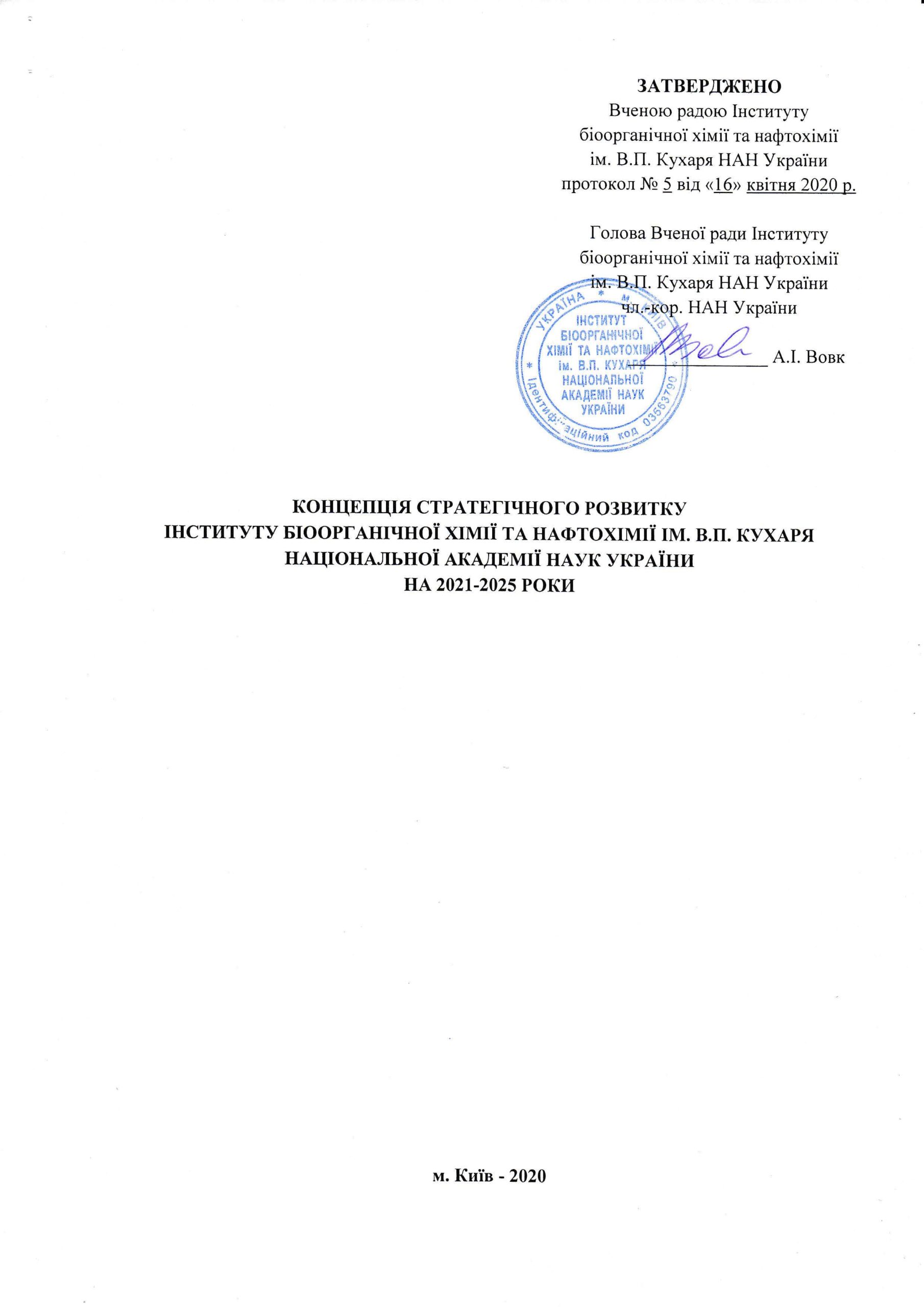
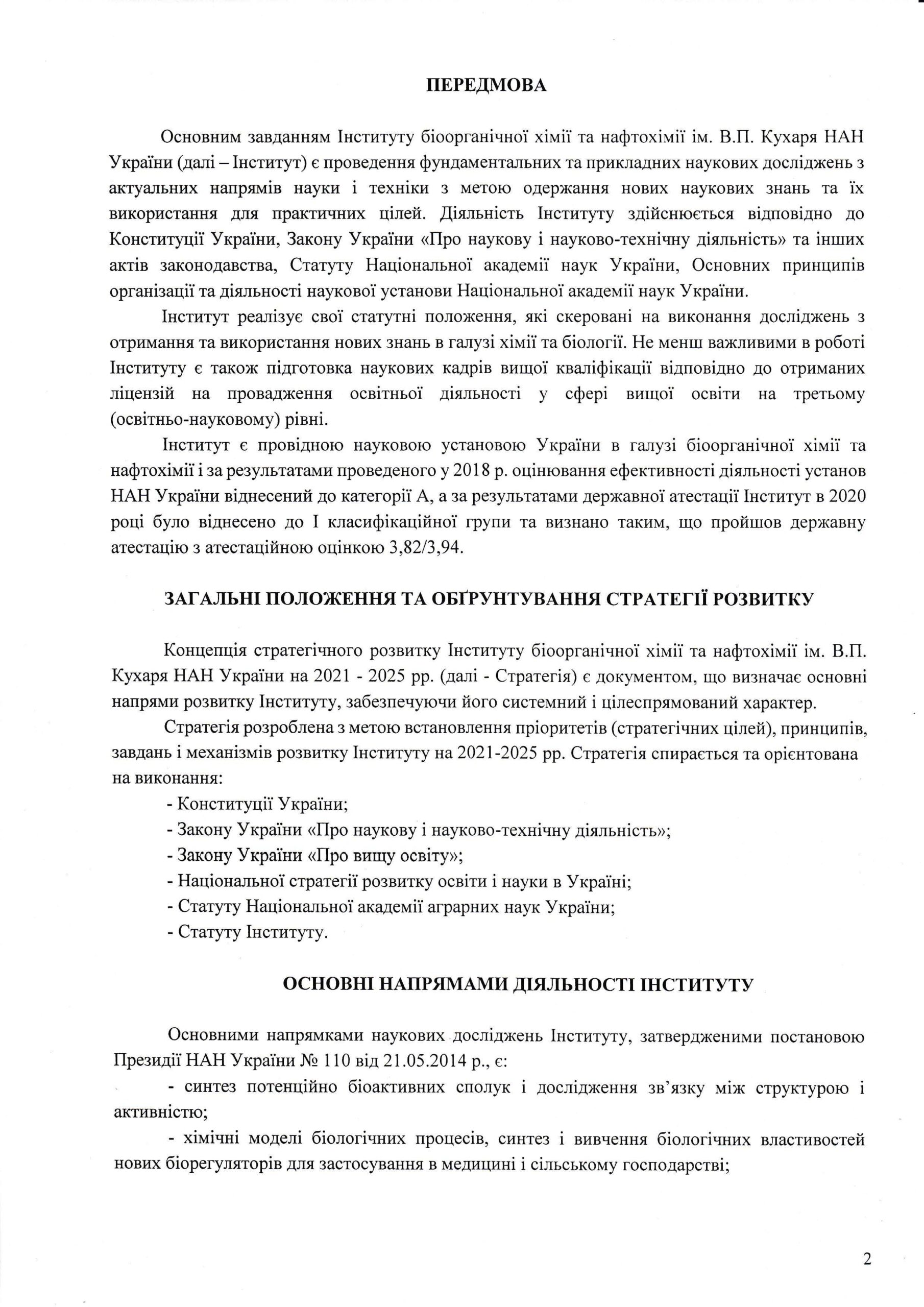
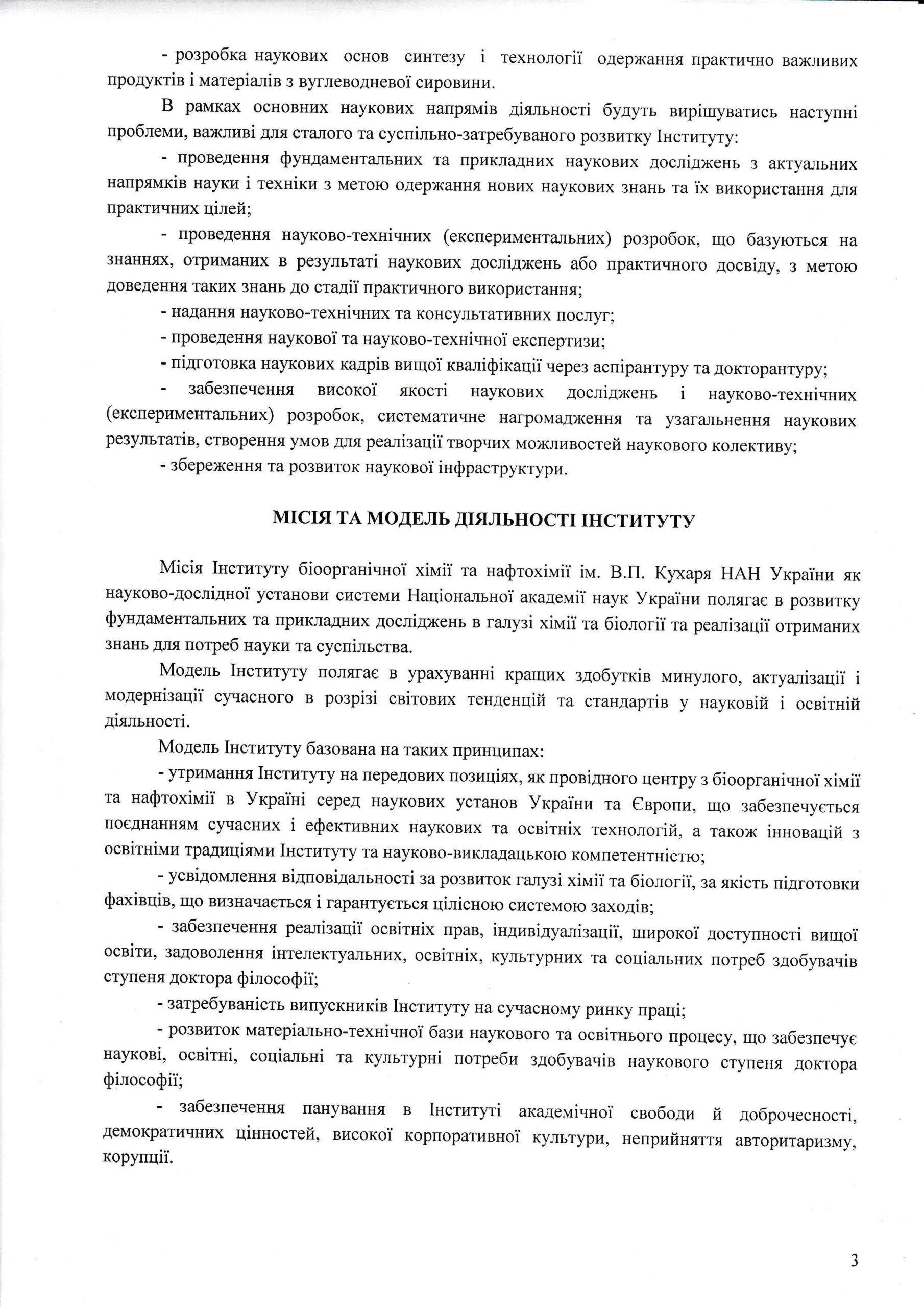
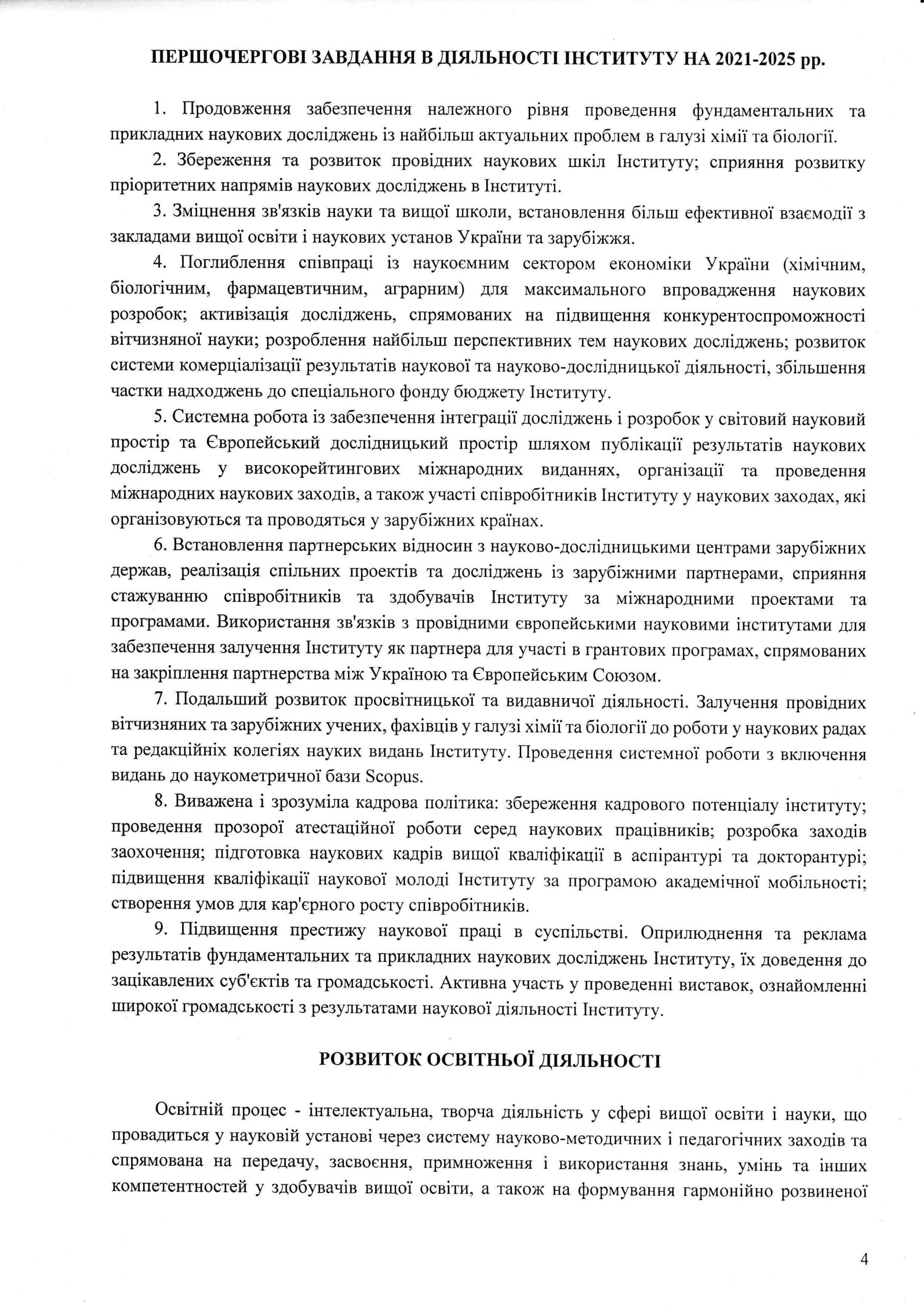
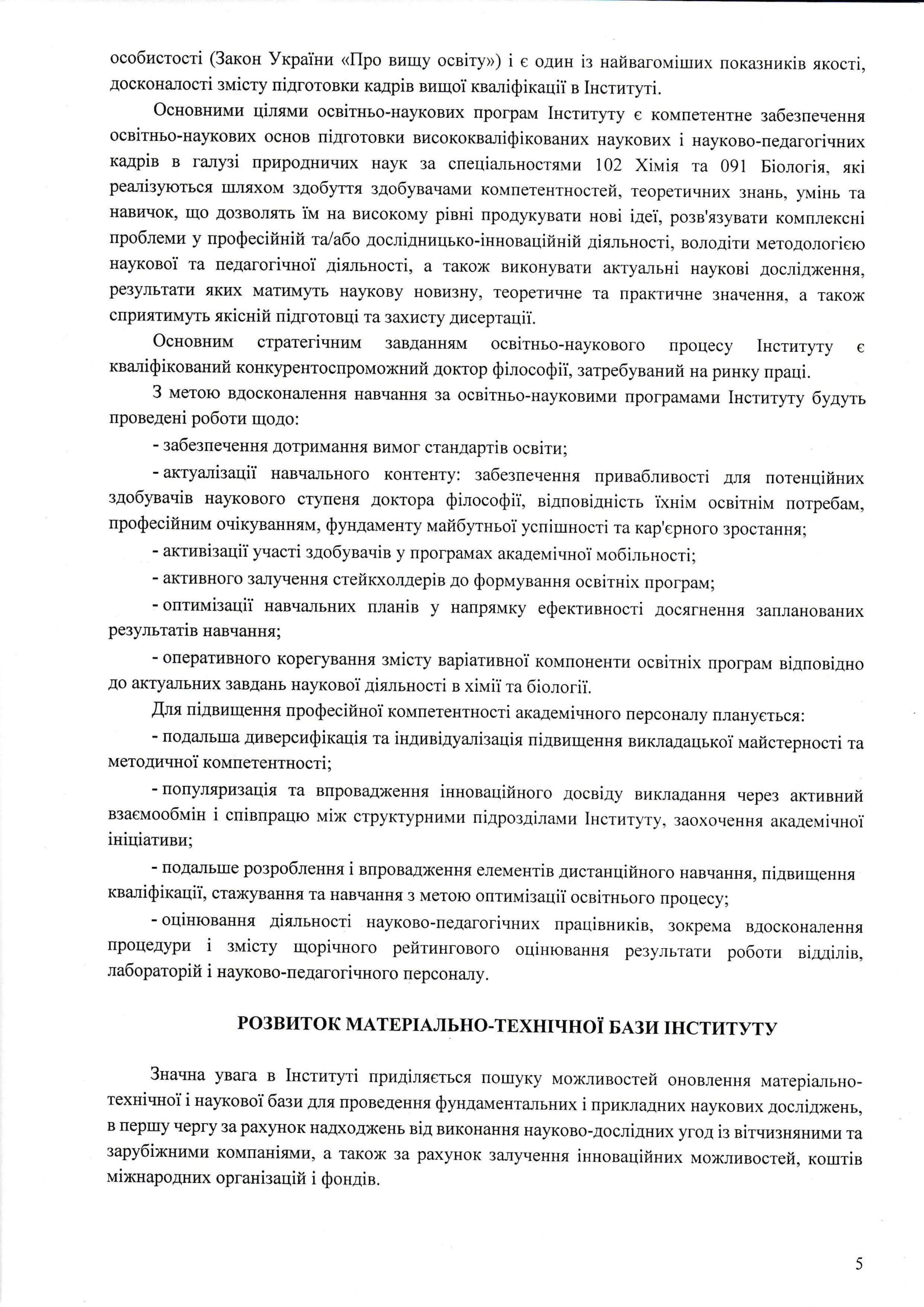
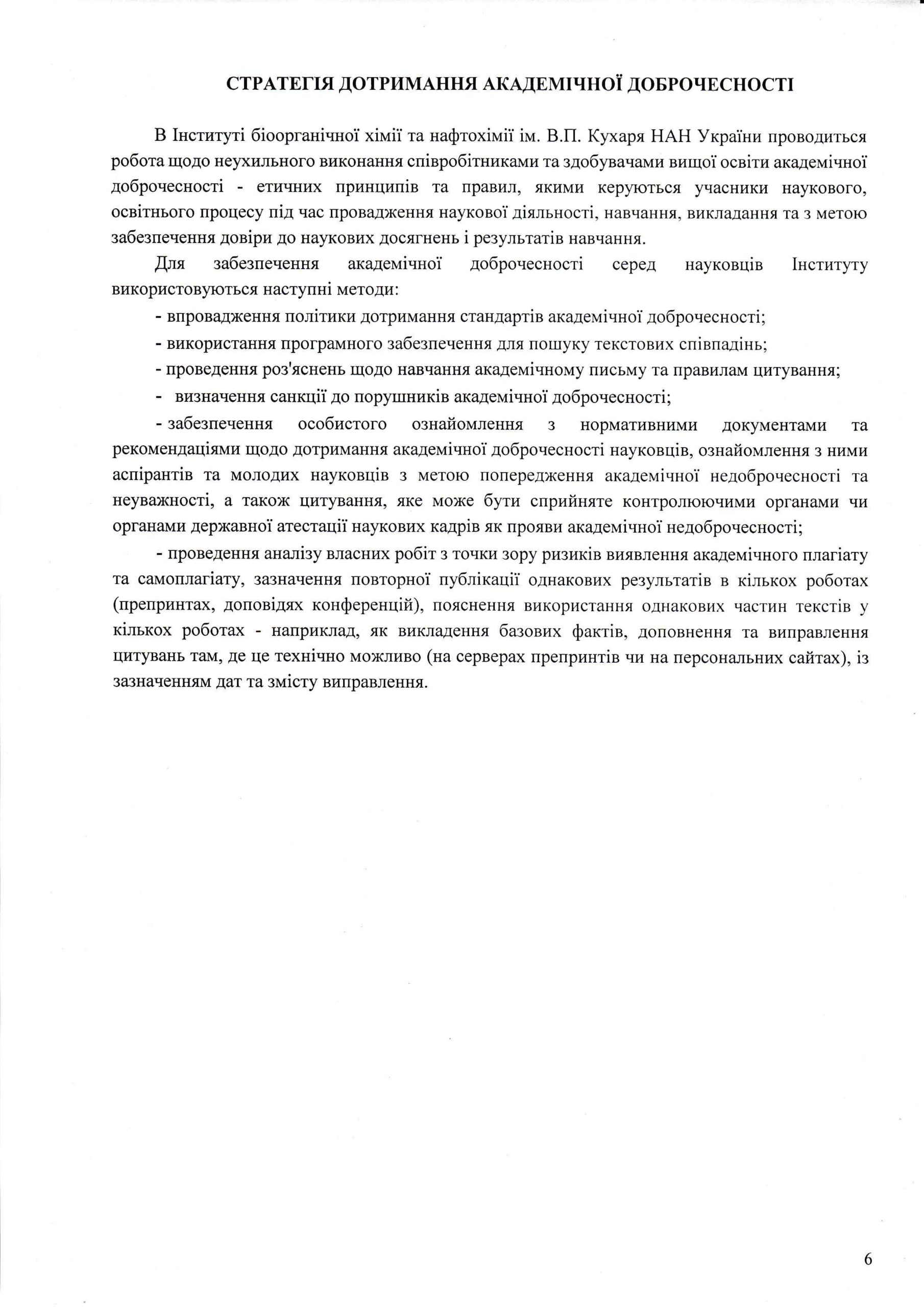
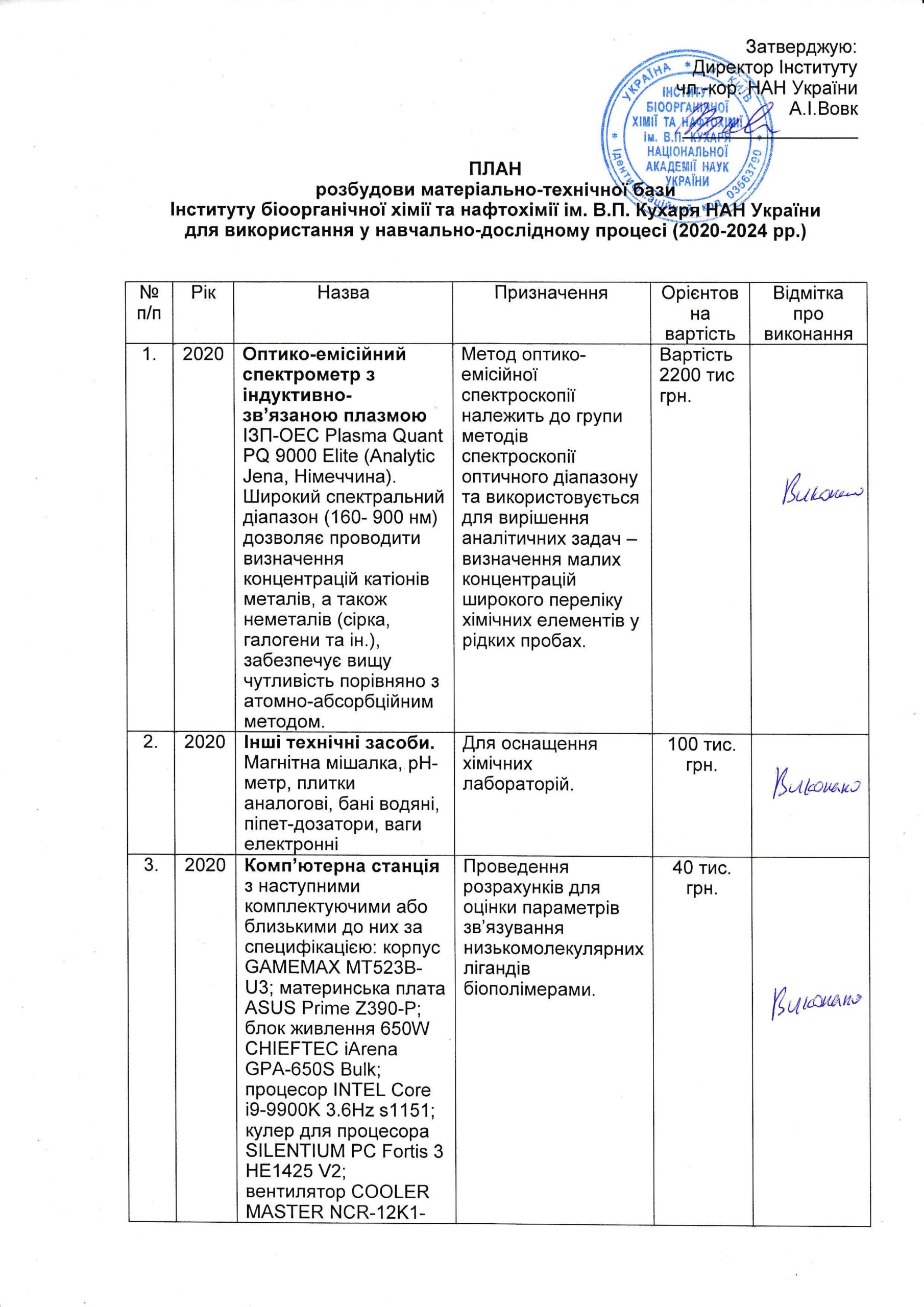
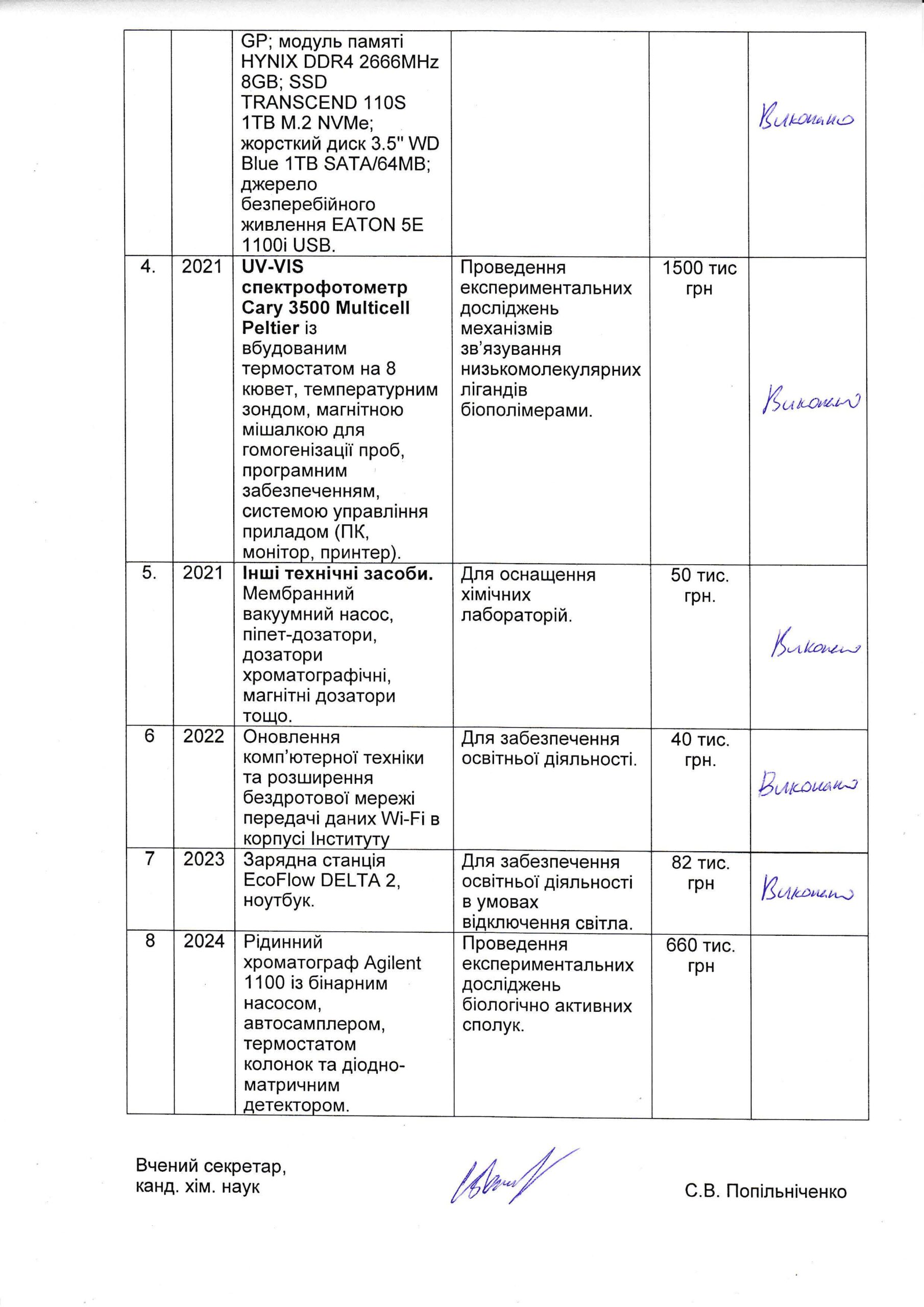
All educational and scientific programs for the preparation of PhDs at the V.P. Kukhar Institute of Biophysics and Biotechnology of the National Academy of Sciences of Ukraine are open for discussion and comments and suggestions from all stakeholders. Please send all suggestions to popilnichenko(at)bpci.kiev.ua with the subject line PROPOSALS_FOR_OP NAME.
Questionnaire for graduate students
https://docs.google.com/forms/d/e/1FAIpQLSfIM4aQwDmNc7sRbvm708exUZs24Yr–HKkj7rdTWCTx2lcfQ/closedform
Selected reviews and feedback on educational and scientific programs 102 – Chemistry and 091 – Biology

The V.P. Kukhar Institute of Bioorganic Chemistry and Petrochemistry of the National Academy of Science of Ukraine is an esteemed scientific center in Ukraine, providing a powerful research infrastructure for the education and training of professionals in the field of biology, medicinal chemistry, and structural biology. Graduates are equipped with the skills and knowledge to conduct original and independent research.
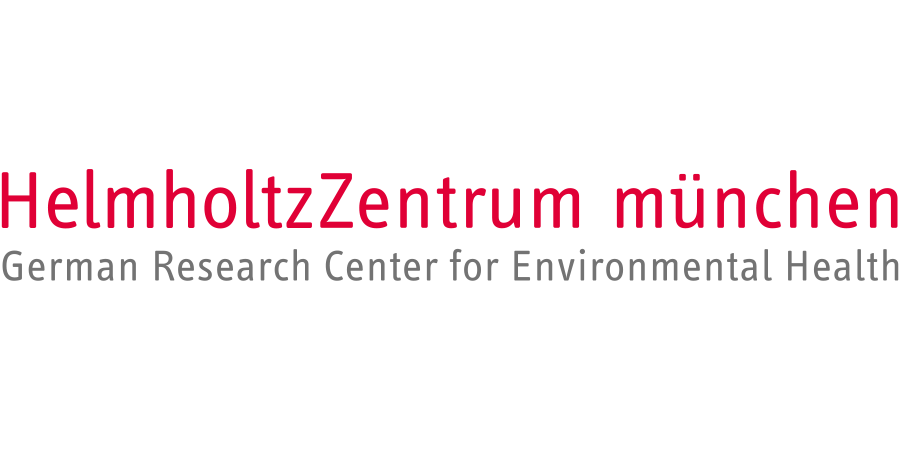
Освітньо-наукова програма з підготовки докторів філософії зі спеціальності «Хімія» передбачає освітню та наукову складові, освоєння яких надає можливість здобувачу одержати теоретичні знання, уміння, навички та інші компетентності, достатні для продукування нових ідей, розв'язання комплексних проблем в галузі хімії, оволодіння методологією наукової та педагогічної діяльності, а також проведення власного наукового дослідження, результати якого мають наукову новизну, теоретичне та практичне значення.
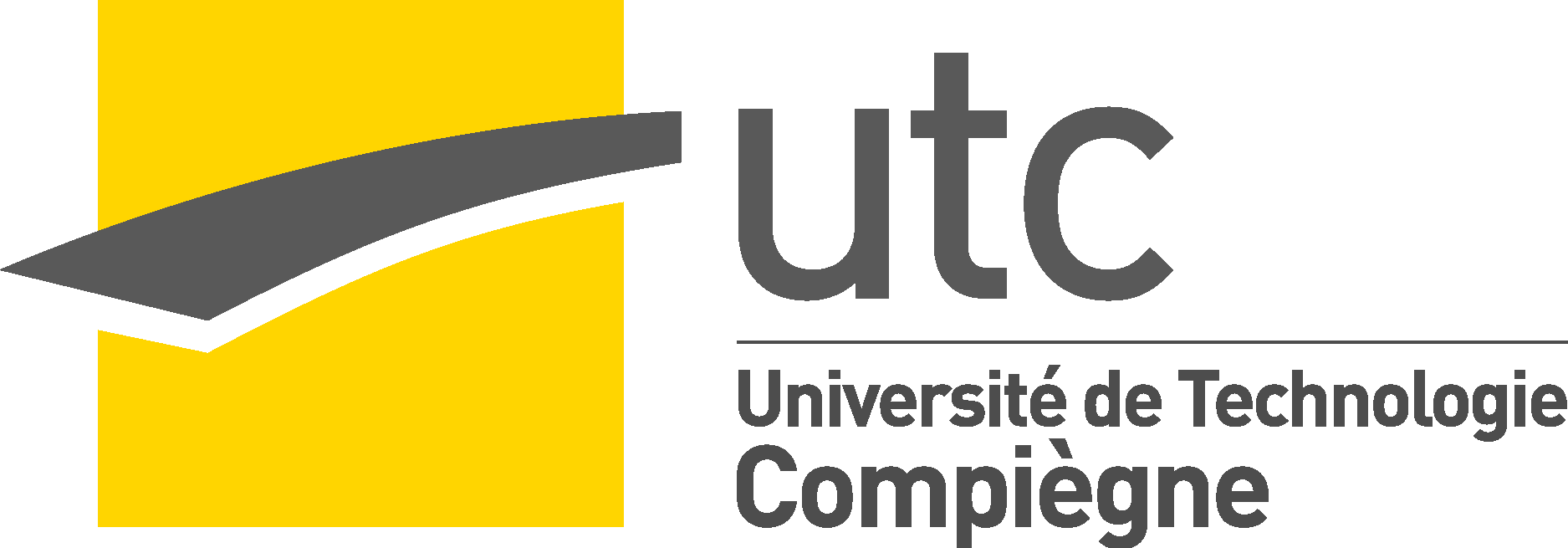
I can for sure positively evaluate PhD educational and scientific program 091 “Biology” in IBCP based on PhD students that had internships in my research facilities in the frame of joint projects. Those opportunities for PhD students helped a lot in achieving valuable results for their PhD research using the University of Technology of Compiègne equipment.
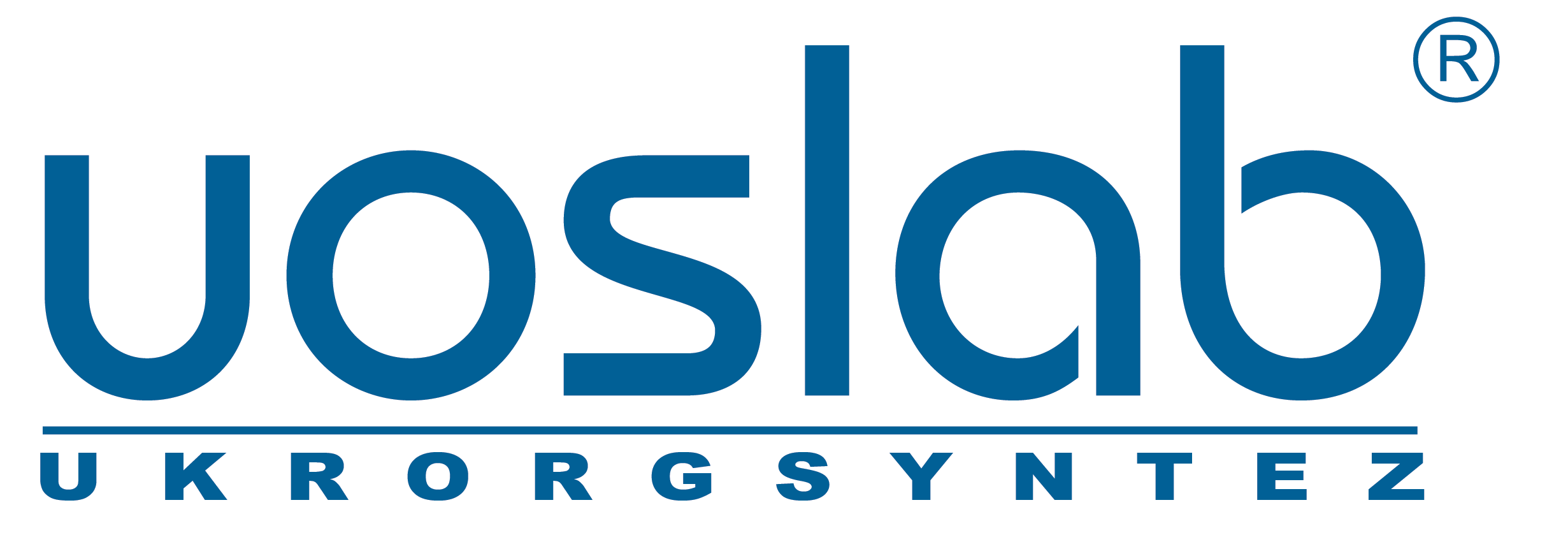
В освітньо-науковій програмі визначені програмні компетентності виходячи із видів і завдань розвитку галузі хімії. Фахові компетентності освітньо-наукової програми
носять практичний характер і можуть бути використані у професійній діяльності майбутніх фахівців.
How to check the current indexing of a publication in Web of Science Core Collection https://mjl.clarivate.com/
Webinar on April 22, 11:00 a.m.–1:00 p.m. “On the quality of scientific publications: Web of Science and Antiplagiat.” Registration –https://bit.ly/3tTiIMb Certificate provided (if you attend more than 90% of the webinar), to be received by April 25.
youtube Clarivate Analytics in Ukrainian https://www.youtube.com/channel/UCSMJ679M7c78lYA5eu41jYg
on Facebook https://www.facebook.com/ukrsj and https://www.facebook.com/Ukr.Sci.Kit
on Telegram Analytics in Ukrainian t.me/Ukr_analytics
The traditional series of webinars in Russian will begin on April 12, 2021. The schedule is available at https://clarivate.com/ru/webinars/
The schedule of webinars in English and EU languages (without certificates) is available at https://clarivate.libguides.com/home
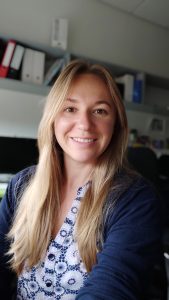
Tetiana Kalachova
Current position: Research Fellow at the Institute of Experimental Botany of the Czech Academy of Sciences (Laboratory of Plant Pathological Physiology)
Education: Institute of Bioorganic Chemistry, National Academy of Sciences of Ukraine (postgraduate studies) and University of Paris-Est, France, Taras Shevchenko National University of Kyiv, Ukraine (master’s degree)
Brief biography: After completing her master’s degree in virology at Kyiv National University, she entered the postgraduate program at the Institute of Bioorganic Chemistry and Petrochemistry of the National Academy of Sciences of Ukraine under dual supervision (dual form Ukraine-France). She studied phospholipid signaling in the context of phytohormonal perception and found that lipid kinases, especially DIACYLGLYCEROL KINASE 5, can act as a signaling center in stress adaptation, especially in the early stages of pathogen recognition and immune response establishment.
Since joining the Laboratory of Plant Pathophysiology in Prague, she has focused on plant defense mechanisms, especially pathways related to the phytohormone salicylic acid. I am particularly interested in the relationship between actin cytoskeleton remodeling, phospholipid signaling, and disease resistance.
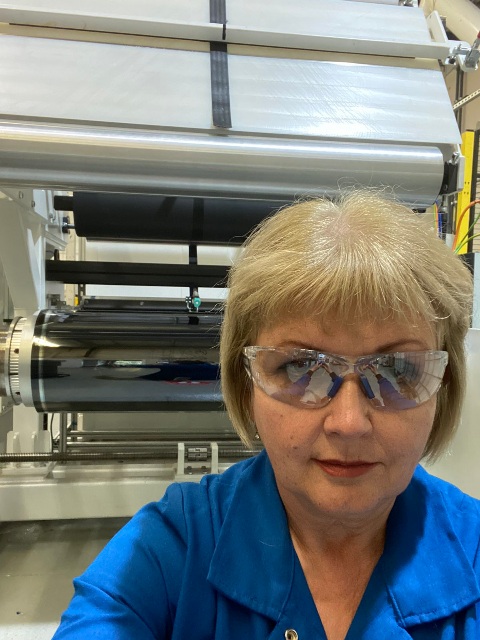
Marina Gorbunova
Graduate of the Chemistry Department of Taras Shevchenko National University of Kyiv (specialization: Organic Chemistry). While still a student, she interned in the Department of Fine Organic Synthesis under the supervision of I.I. Gerus and, after successfully graduating from university, continued to work as a chemical engineer from 1989 to 1992. In 1992, she defended her thesis in bioorganic chemistry for the degree of Candidate of Chemical Sciences on the topic “Synthesis and study of the chemical properties of
β-ethoxypolifluoroalkyl ketones.” The scientific supervisors of the dissertation research were Candidate of Chemical Sciences, Senior Researcher of the Department of Fine Organic Synthesis I.I. Gerus and Academician of the National Academy of Sciences of Ukraine, Doctor of Chemical Sciences, Professor V.P. Kukhar (1942-2017).
After defending her thesis, she did postdoctoral research at Texas Tech University in Lubbock (2001-2002) and at the US Department of Energy’s Oak Ridge National Laboratory in Oak Ridge, Tennessee (2002-2006). Her main areas of research were the synthesis and study of the physicochemical properties of new calixarenes containing tert-butyl and sulfonamide groups for the selective extraction of alkali and alkaline earth metals.
Since 2006, she has been working at the biotechnology company Eastman Chemical Company (Palo Alto, California, USA), where she developed and studied the parameters of polymer materials based on cellulose esters. She currently heads the project division of polymer films (Films Division).
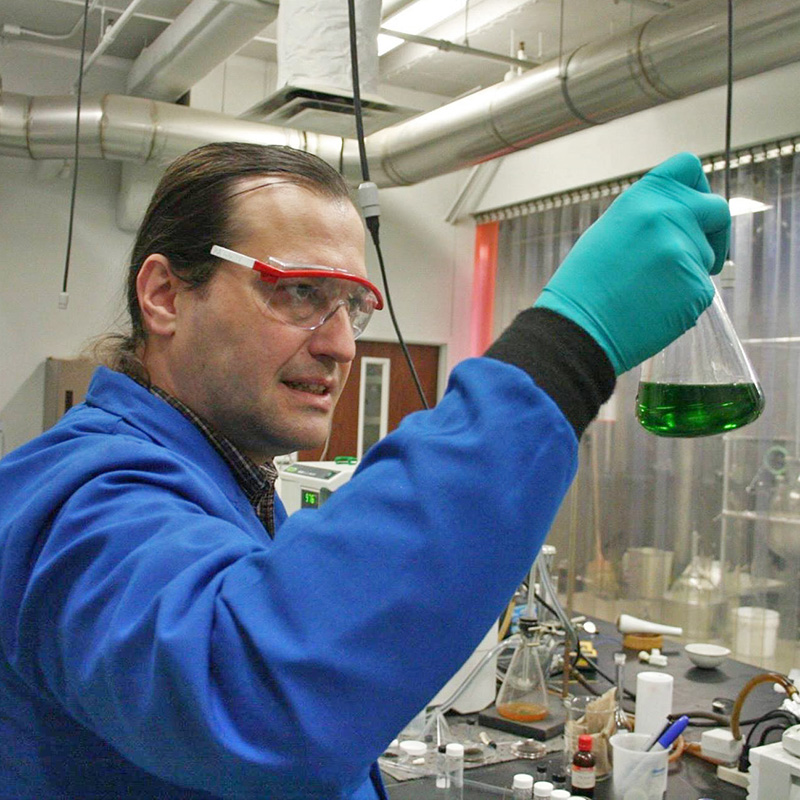
Oleksii Kacharov
Graduate of the Faculty of Chemical Engineering of the National Technical University “Igor Sikorsky Kyiv Polytechnic Institute” (KPI). While still a student, Oleksii Dmytrovych conducted scientific research in the Department of Fine Organic Synthesis under the supervision of V.A. Soloshonko. After graduating from the technical university in 1996, he worked as a researcher and in 1998 defended his thesis on “Asymmetric synthesis of fluorine-substituted serines by catalytic aldol reactions of isocyanic acid derivatives” in the field of organic chemistry. The scientific supervisor of the dissertation research was Doctor of Chemical Sciences, Professor, Academician of the National Academy of Sciences of Ukraine V.P. Kukhar.
After defending his thesis, he worked for some time in the Department of Fine Organic Synthesis under the supervision of I.I. Gerus, then joined the research group of P.O. Krasutsky at the Natural Resources Research Institute at the University of Minnesota (Duluth, Minnesota, USA). His research focused on the synthesis of potentially biologically active triterpenes of the lupane series and the optimization of methods for obtaining important components of birch bark extract, such as betulin, betulinic acid, etc.
Currently, O.D. Kacharov continues his research at NRRI (Duluth) as an independent scientist and project manager. His work includes the following areas: modification and characterization of natural substance extracts, search for new biodegradable polymers and wood protectors, development of new methods for obtaining and using synthesis gas and biochar.
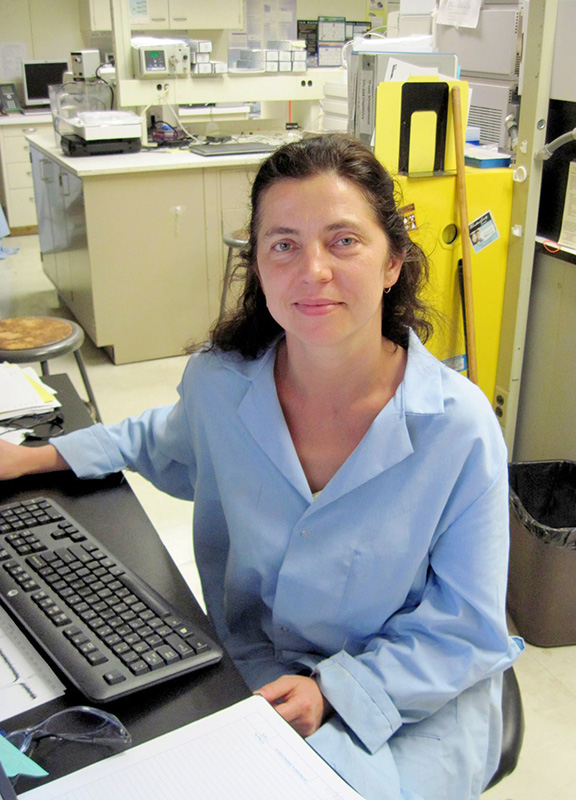
Lilia Kacharova (Kuchivska)
Graduate of the Faculty of Natural Sciences of the V.G. Korolenko Poltava National Pedagogical University (specialization: Chemistry and Biology). She studied in the postgraduate program in Bioorganic Chemistry from 1998 to 2002. In December 2002, she successfully defended her thesis on “α-halogen-substituted
β-alkoxyvinyl(polyfluoroalkyl)ketones in the synthesis of heterocyclic fluorine-containing bioregulators.” The scientific supervisor of the dissertation research was I.I. Gerus, Candidate of Chemical Sciences, Senior Researcher at the Department of Fine Organic Synthesis.
After defending her thesis, she worked as a research fellow at the University of Minnesota (Duluth, Minnesota, USA). Her research focused on the synthesis of potentially biologically active triterpenes of the lupane series, which are found in birch bark extract. A number of important derivatives were obtained – inducers of programmed tumor cell death in in vitro conditions. In 2016, Lilia Mykolaivna worked at Twin Ports Testing in Superior, Wisconsin, USA, where she was engaged in the chemical analysis of alternative and renewable types of biofuel.
Since 2017, she has been working at the Advanced Materials Center at the University of Minnesota, where she develops new polymers that serve as metal substitutes in mechanical engineering, and also teaches organic chemistry at the private College of St. Scholastica in Duluth.
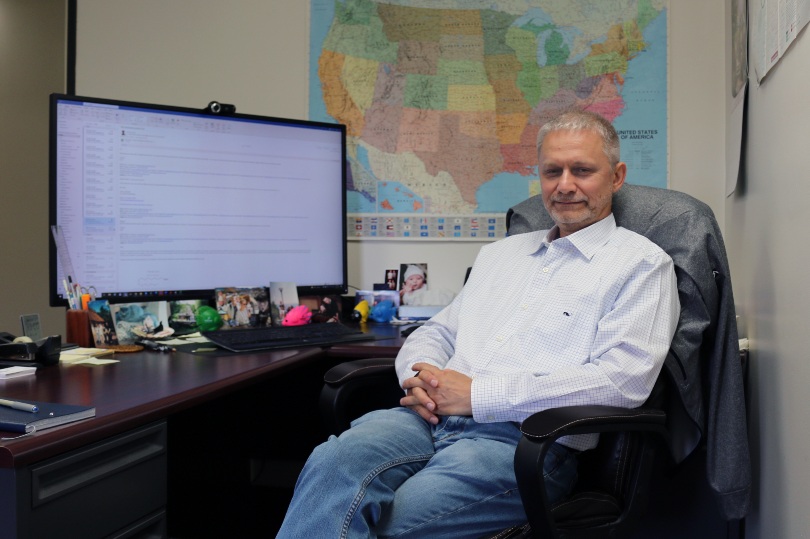
Andriy Kornilov
Graduate of the Chemistry Department of Taras Shevchenko National University of Kyiv (specialization: Chemistry of Natural Compounds). Studied in graduate school specializing in Bioorganic Chemistry from 1984 to 1987. In 1990, he defended his thesis for the degree of Candidate of Chemical Sciences on the topic “Synthesis of eicosanoids and their fluorine-containing analogues.” The scientific supervisor of the dissertation research was Academician of the National Academy of Sciences of Ukraine, Doctor of Chemical Sciences, Professor V.P. Kukhar (1942-2017).
After defending his thesis, he did postdoctoral research at the University of Paris-Sud XI in France (1994-1995) and the State University of New York in Albany, USA (1997-1998). After returning, he worked for some time at the Institute, where he continued to develop fluorine-containing synthons with the aim of obtaining CF3– and CHF2-analogs of biologically active compounds.
Since 2002, Andriy has been working at the biotechnology company Cayman Chemical (Ann Arbor, Michigan, USA), where he has risen from research associate to director of the research and development department. Cayman Chemical specializes in the manufacture of reference standards and the development of highly sensitive analytical systems for the identification of naturally occurring compounds.
Under Andriy’s leadership and with his direct involvement, over 100 natural compounds (mainly lipids) were synthesized, the structure of a new metabolite of arachidonic acid was established, a new drug for the treatment of glaucoma was synthesized, and the use of deuterated standards of natural polyunsaturated fatty acids was initiated.
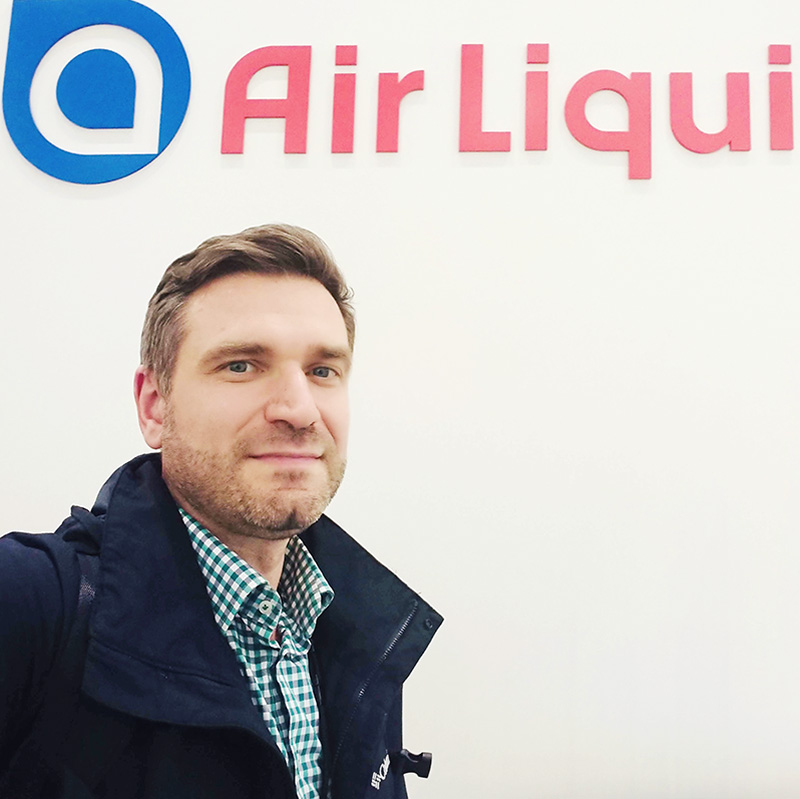
Vitaliy Nesterov
Graduate of the Rubizhne branch of the East Ukrainian National University, Rubizhne (specialization: “Chemical Technology of Organic Substances”). Studied in graduate school specializing in “Bioorganic Chemistry” in 2002-2006. In 2007, he successfully defended his thesis on “Asymmetric Reduction of Ketophosphonates.” His thesis advisor was Corresponding Member of the National Academy of Sciences of Ukraine, Doctor of Chemical Sciences, Professor O.I. Kolodyazhny.
After defending his thesis, he did postdoctoral research at the Institute of Inorganic Chemistry at the University of Bonn (2009-2014 and 2015), Kyoto University (2014), and the Technical University of Munich (2016-2019). His research focused on the study of the properties of phosphorus analogues of carbenes and carbenoids, the synthesis of phosphorus-containing heterocycles, as well as low-valent organoelement compounds of elements of the 14th group (Si, Ge, Sn) and their application in catalysis.
Since 2019, Vitalii has been working in the research and development department (R&D Electronics) of Air Liquide (Tokyo, Japan), where he develops the latest semiconductor materials. Air Liquide has offices in nearly 80 countries and is a world leader in the production of gases, technology development, and services for industry and healthcare.
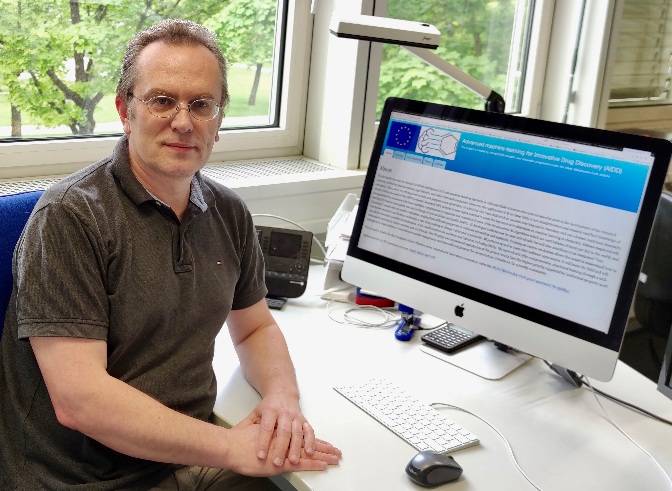
Igor Tetko
Graduate of the Department of Physical and Chemical Biology of the Moscow Institute of Physics and Technology (MIPT). Worked as a researcher in 1989-1994. In 1994, he defended his thesis in bioorganic chemistry for the degree of Candidate of Chemical Sciences on the topic “Application of neural networks for identifying the relationship between structure and biological activity.”
His scientific advisor was the head of the Department of Medical and Biological Research, Doctor of Medical Sciences, Professor O.I. Luik (1947-2000). After defending his thesis, he did postdoctoral research at the University of Lausanne in Switzerland (1996-2001).
Since 2001, he has been working as a senior research fellow at the Institute of Structural Biology at the German Research Center for Environmental Protection “Helmholtz Zentrum München” (Neugerberg, Germany). In 2011, he defended his doctoral thesis (habilitation) on “Associative neural networks: an innovative method for predicting physicochemical, biological, and ADME/Tox properties” in the field of chemoinformatics at the University of Strasbourg (Strasbourg, France).
In 2016, he was one of the most cited scientists in the field of computer science and engineering according to http://shanghairanking.com. Igor Volodymyrovych is a member of the Executive Board of the European Neural Networks Association (ENNS) and coordinator of the Innovative Training Network European Industrial Doctorate “Advanced Machine Learning for Innovative Drug Discovery (AIDD)” the Marie Skłodowska-Curie Fund, which is part of the European Union’s specialized program for research and innovation “Horizon 2020.” He has been invited as a visiting professor at universities in France, Saudi Arabia, and China on numerous occasions.
Igor Volodymyrovych’s main scientific achievements include the development of an online chemical modeling environment (http://ochem.eu), as well as data analysis algorithms for chemoinformatics, machine learning methods, algorithms for predicting the biological activity of molecules, etc.
He is the author of over 200 publications in refereed scientific journals, with a Hirsch index (h-index) of 47 in Scopus.
V.P. Kukhar Institute
of Bioorganic Chemistry and Petrochemistry
NAS of Ukraine
© 2026 IBOPC NAS of Ukraine
Comments and suggestions from interested parties